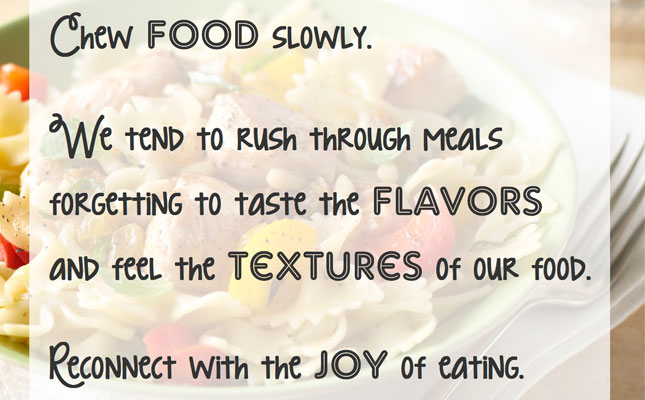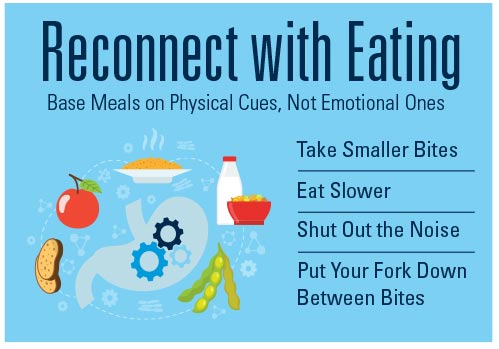
I hope by now, you are all well aware of the do’s and don’ts of Mindful Eating through the series of four blogs. I have talked about the concept of Mindful Eating and how Mindless Eating can be harmful. I discussed why should you eat slowly to enjoy your meal (https://goqii.com/blog/mindful-eating-slow-down-and-enjoy-your-meal-2/) and shared some tips on how can you eat slowly. Then I took you through portion control and how to be wise (https://goqii.com/blog/mindful-eating-control-portions-and-be-wise-part-3/). In the fourth blog we talked of emotional eating and how it can be avoided (https://goqii.com/blog/mindful-eating-mind-your-mood-part-4/). In the last of the blog in this 5-Part series on Mindful Eating, I will talk about connecting back with food and how one can do that.
Mindful Eating is eating with attention and right intention. It is eating with the intention to care for yourself. It is also eating with the attention necessary for noticing and enjoying your food and its effects on your body.
If you choose to eat each and everything you can lay your hands on, you indeed are disconnected from your food-the very ingredient of life that keeps you alive and going. And, when you are disconnected from your nutrition, you make yourself vulnerable to a host of illnesses, life-threatening disorders, and loss of longevity.
I was wondering-what makes us disconnected from our nutrition as we grow? For I am certain we were connected with our food when we were children (as that is how we learned that seeds sitting in an apple core can grow into an entirely new apple tree! And, that the water we drink doesn’t come from tap but, from a faraway river channel).
So, I have come to conclude that with time, our body just repeats what it has done previously as trained by the mind. These are nothing but habits. And unless our mind makes a choice, the body will not break the pattern even if it is a potentially harmful one. In terms of eating, since it’s the most repeated skill of all human behaviours, our mind has pretty much trained us to ignore eating and be on an autopilot mode while grabbing a bite. Thus, we don’t ask ourselves anymore-where do these strawberries come from? Or what goes into making a Pizza?
If we can turn around our ways and connect back with our meals, learning about the foods that will help us and those that will not, and make a conscious choice to pick the right dish at the right time by breaking the habit of eating everything at any time, a lot of our future troubles will get resolved. Turning into a mindful eater and making an informed choice-an intention to care for yourself-is what it will take.
To help you get connected, I am sharing some simple tips here with you today

1) Connect right from grocery shopping: Most of us go grocery shopping on weekends. And there is usually a long queue at the billing counter. In a hurry to finish our job, we just throw into our cart whatever is more attractive or convenient-which is mostly processed foods. To connect with your food, shop smart at the store itself.
i) Fill up your cart from produce section first. Once you have half filled up your cart with fruits and veggies, you’ll be less tempted to shop for processed and ready-to-eat meals.
ii) Read ingredient list and nutritional labels. Choose food products with short ingredient list, ingredients that you can pronounce, with 0 trans fats, no sugar or if at all, appearing last on the list, mentions whole grain composition, small per serving calories (and not per 100gm) and has fiber serving size >2 units. If a food product matches these criteria, it is worthy to be nourishing you.
2) Be a food critic: You don’t need to write a review or become a fussy eater. But learn the art of analyzing your food dishes. What are you eating? What are the ingredients that go into this dish? How is it prepared? How’s the aroma, texture, color of the meal? How does it make you feel? Knowing the answers to all of these questions will help you know why you eat what you eat and thus will help you turn into a mindful eater.
i) One player once mentioned to me he can’t stop eating ‘vada-pao’ the fried snack tucked between white flour bread. On my insistence, he made the attempt to analyze how he feels while having the snack. To his own surprise, he found out that it was only the act of tearing the bread apart and tucking in the fried snack, which appealed to him. He didn’t really enjoy the taste of the snack as much as he liked the procedure of eating it!
So to know yourself and your eating habits better, be a food critic.
3) Make an attempt to learn about your nutrition
# Know major food groups like carbs, proteins and fats and the minor but essential ones like vitamins and minerals. Know which food dishes you commonly eat fall in these categories and influence you.
# Know alkaline and acidic foods- because our blood pH is slightly alkaline (7.3-7.4) and to keep our system running efficiently, we need to maintain this alkaline pH. Your food choices will play an important role in this physiological action.
# Know various benefits of different herbs-cinnamon, turmeric, coriander, cloves, ginger, garlic, fennel, cardamom, coriander, saffron, fenugreek, garam masala, varieties of pepper, and so on. You have them in each and every single dish. They deserve your attention.
# Know how to eat your fruits right, what time of the day and how much and in what combination is good enough.
# Know combination of foods that can enhance each other’s nutritional values-like Vitamin C with Iron rich foods, Vitamin D and calcium rich foods and know what food combinations can interfere with each other’s absorption in the body like Iron and Calcium heavy foods don’t go well together.
# Know what meals are best options for pre and post workout nutrition
# Learn why you should not eat white sugar, white flour or white salt. Or have an aerated drink ever
# Know replacements for sugar and white salt and what you can do to beat down your sugar cravings.
# Understand why dark chocolates or nuts are good for you despite being calorific or why eating a healthy ‘mukhwas’ (mouth freshner) after a meal can be a good habit.
And, there are many more such small and simple things to know about your everyday nutrition. Keep asking your coach or make an attempt to read and learn yourself.
Mindful eating is much more than learning about your food or food choices alone or practicing slow eating, in the moment eating itself. It encompasses having a relationship with your food wherein you respect your meals and feel gratitude towards them.
To sum up, mindful eating is a way of nurturing your physical self, harmonizing your mental state, and satisfying your soul.
If you have been missing out on mindful eating, get on the mindful eating wagon now! If you found this information valuable, share your thoughts in the comments below and for more insights, check out Healthy Reads or for further guidance speak to a certified expert by subscribing to GOQii’s Personalised Health Coaching here.
#BeTheForce




Thanks madam nicely m making the words
so effectively that these firmed images in mind
& that too true images of what we usually do every day .
But whatever activity a person do (common)
To start from getting up . brushing. Bathing Breakfast dressing driving office work lunch drinking. , Returning. Talking sleeping. ___Endless which end with. ING .
As human we learn these activities , practice and some Master it .
But. What is my personal problem or observation (what ever u call). While learning we. Do Total act Conciously after as more we practice. Concious components become. less lesser least .
Many examples can be given. But best is Learning to drive. A vehicle
.We can see many Masters Using Mobile ( not good thing though).
But coming to eating
Before that one nearer example I experienced is bathing
We (I) are aware of just 1st 2or 3 mug s of water or sprinkle. of shower. Rest bathing follow subconsciously.
Similarly Eating. We enjoy 1st bite or scoop rest not only we eat subconsciously we eat fast.
That’s what I understood from the blog.
(Recent change of sugar tea to sugarless I became more aware it’s true)
Thanks
It’s very difficult (not impossible) to do it Conciously .
Many factors are involved I m not expert to enlist those.
Just I will use one example
Some one is working as Typist .
Now He/ She just type one or two Words (not even a line ) Conciously.
What his mind is mastered. is alphabet SPACE alphbet PARAGRAPH
only to concoius again at end.
That’s why he never find spelling mistake of own
Now if he/she ask to type a important letter CONCIOUSLY bound to do more mistake more time &End result (myself seen number of times ) have to written or type self during off_office hours
Same way if we try to eat Conciously , may succeed for 2-3 days .
But unless that concoiuness eating don’t become subconscious HABIT. really difficult task.
All repitative activity are done 90% subconsciously (controlled by Cerebellum)
And our Cerebrum (Master Brain ) a lazy one keeps itself free for new leaning .
Another influence of Hormone (which u rightly pointed out ) makes craving. for Fast food
It’s very easy to start mindful eating but very very difficult to maintain or continue it
Will be happy if u mention some easy trick to MAINTAIN it for loner loner time
Thanks once again
I like whole series .
Ajay
Hay Ajay,
Start cooking your meals it will help
Hi Ajay
Thank you for sharing your thoughts 🙂 It is indeed a common thing to do repetitive acts subconsciously without putting an attention to it. As rightly said because brain is mostly busy learning a new act. That’s why the importance of healthy habits formation, because once learned/mastered healthy habits like mindful eating, brain will always continue to subconsciously do it.
To make this happen discipline and patience will be required.
And a quick trick that will work is to always associate positive emotions while you are still trying to master a good healthy habit. Say while trying to form the habit of brushing your teeth before bed, experience the freshness it brings in your mouth,feel good about it, reiterate in mind brushing your teeth at night will help you prevent dental caries and thus have beautiful teeth and so on. Associating positive emotions with the task will help you to go back onto doing the healthy act again and again and thus help you to maintain the healthful rhythm for longer period of time.